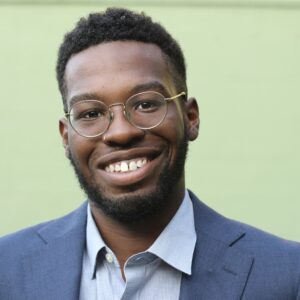Rapid Response Media Messaging Research Will Promote Health and Racial Equity


Citing the urgent need for more effective and equitable health communication, researchers at Wesleyan University are collaborating with two other universities on a unique rapid response research endeavor led by Cornell communication professor Jeff Niederdeppe and funded with a newly announced $5 million grant from the Robert Wood Johnson Foundation (RWJF).
“At this moment it is crucial to understand both the nature of and the potential of messaging around policies promoting racial and health equity,” said Steven Moore, assistant professor of government and an expert on race and politics. “I’m excited to be a part of this fantastic team of scholars wrestling with these pressing and consequential issues and developing community-engaged research that can improve the lived experiences of people in marginalized communities.”
Moore along with Erika Franklin Fowler and Laura Baum of the Wesleyan Media Project are working with researchers from Cornell University and the University of Minnesota to speed up an academic research process that can take years. Their goal is to identify developing public health issues, address conflicting messages, and counter misinformation in a matter of months using three interlocking research hubs:
- Wesleyan’s Media Tracking Hub will monitor news coverage and political commercials to quickly identify developing social safety net issues and messaging that have racial equity implications.
- Cornell’s Media Impact on Mindsets and Values Hub will conduct surveys and experiments to determine the messaging that is most effective for promoting health and racial equity.
- Minnesota’s Engagement, Dissemination and Implementation Hub will work with journalists as well as public health officials, affected communities, and advocacy organizations to put the research findings into practice.
As a team, the researchers will investigate how media sources portray racial and health inequality in social safety net policies and a variety of other health and racial equity-related issues. They will measure the impact on the public and policymakers made by stories designed to advance social change. They will share findings on evidence-based communication strategies that can accelerate support for targeted investments for improving health and racial equity. Finally, they will establish a model for effective research-practice partnerships so that accurate information can rapidly enter the nation’s media ecosystem.
When an issue develops concerning government programs—for example, early childhood education or Medicaid expansion—the researchers will quickly identify what they call “windows of opportunity” in the public debate. When the window opens, journalists and advocates will be provided with timely, accurate and empirically informed information to share through their stories and channels. The information will be disseminated to key stakeholders, including local journalists, advocates, and health organizations.
“Tracking and analyzing variation in local media messaging – in advertising and in news – has always been a strength of what we do at the Wesleyan Media Project,” said Erika Franklin Fowler. “We’re proud to be adding more computational and applied data analysis knowledge and expertise to help advance a culture of health.”
“Not many media researchers focus on local media, but we think it’s important because local media attracts large audiences and is more trusted that national news,” Niederdeppe said. “The quality of the health information on local news leaves much to be desired, but the flip side of that means there are opportunities to strengthen the health content. When we think about advancing health equity and a culture of health, local media can have a local impact on policy discussions.”
This project is unprecedented in its goals, scope, and integration of teams from the three universities, which collectively call themselves the Collaborative on Media and Messaging for Health and Social Policy (COMM). The Collaborative will share its findings through a dedicated website that will include media tracking reports to provide insight on issues that are immediately actionable. COMM will share the results of its message testing experiments, and the three hubs will produce reports, blog posts, and academic journal articles.
The Cornell team is led by Niederdeppe, a professor in the Cornell Jeb E. Brooks School of Public Policy where he also serves as Senior Associate Dean of Faculty Development. Joining him will be Cornell faculty members Jamila Michener and Neil Lewis, Jr.
In addition to Niederdeppe, Michener and Lewis, the other key contributors to COMM include Co-PI Sarah Gollust ’01 and Rebekah Nagler of the University of Minnesota. Faculty, staff, students, and postdoctoral fellows at each university, along with other community-based partners, will also be involved in the initiative.
The Robert Wood Johnson Foundation is the nation’s largest philanthropy dedicated solely to health.

